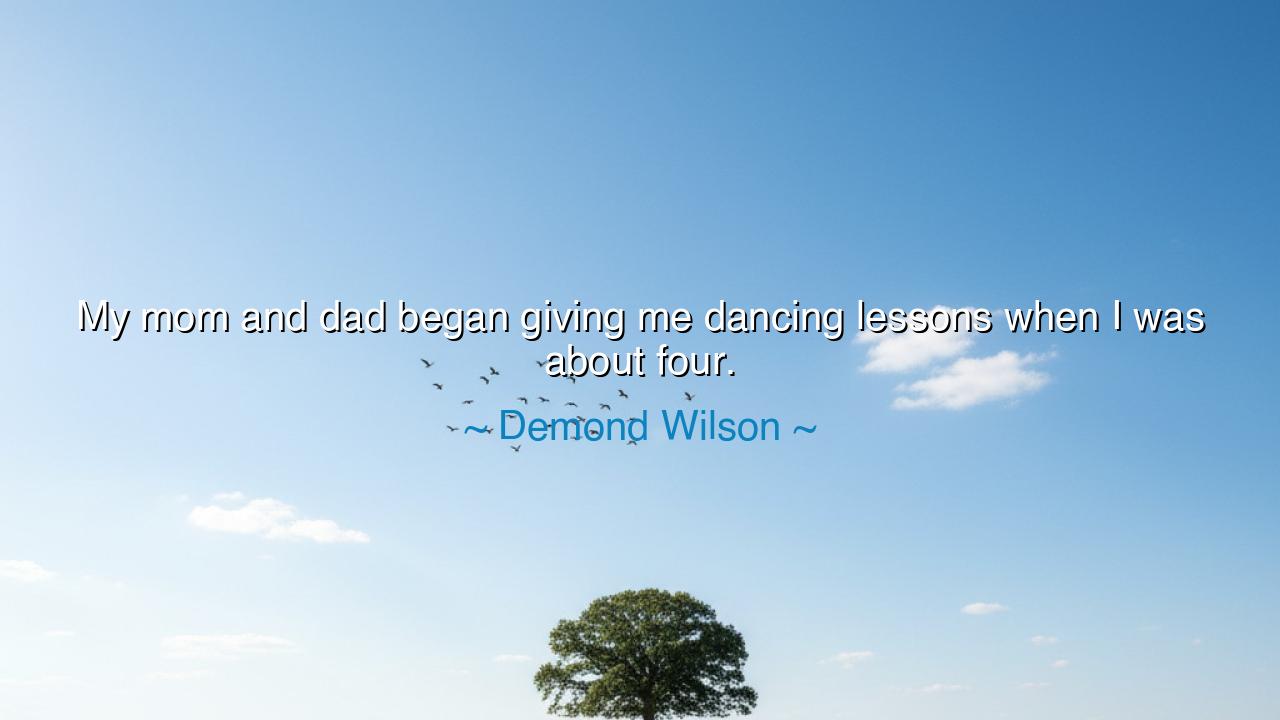
My mom and dad began giving me dancing lessons when I was about






The words of Demond Wilson—“My mom and dad began giving me dancing lessons when I was about four”—may at first sound like a simple recollection of childhood, yet beneath their simplicity lies a truth ancient and profound. It is the story of nurturing beginnings, of how greatness often finds its first spark not in ambition, but in the gentle guidance of love. Within these few words, we glimpse the eternal bond between parent and child—the transfer of art, discipline, and joy from one generation to the next. For even the smallest seed of passion, when tended with care, can grow into a lifelong gift.
At its heart, this quote speaks of foundation and cultivation. No child begins as a master; the steps of life are learned just as the steps of dance. When Wilson’s parents placed him in those early lessons, they were not merely teaching him to move to rhythm—they were teaching him expression, balance, and confidence. The dance was not only of the body but of the spirit, guiding him to listen to the music within. Such lessons, though given in childhood, echo through an entire life. They remind us that the beginnings of greatness are often humble—formed not in fame or fortune, but in the quiet devotion of those who believe in us before the world does.
Throughout history, the story of early nurturing repeats itself. Consider Wolfgang Amadeus Mozart, whose father, Leopold, recognized the divine spark in his son and began teaching him the harpsichord before he could read. Or Tiger Woods, who held a golf club as a toddler under his father’s watchful eye. Both were guided not by force, but by faith—the faith that the seeds of talent must be sown early, that time and patience can shape brilliance from innocence. So too with Wilson, whose parents, through dancing, gave him not just skill, but discipline and artistry, virtues that later carried him through the world of performance and storytelling.
But there is more in these words than history or inheritance. They remind us that art begins at home—that the first teachers in any person’s life are not strangers, but parents, guardians, or those who choose to guide with love. The world often celebrates the end result: the performer on the stage, the champion on the podium, the thinker behind the discovery. Yet it forgets the unseen years of practice, the encouragement, the patience. Wilson’s recollection is a tribute not just to his own journey, but to all who dedicate their energy to shaping another’s dream.
There is also a lesson here about the power of early joy. To begin life in rhythm—to dance, to create, to move—is to awaken a lifelong relationship with beauty. The ancients taught that the arts are gateways to the divine, for through them the soul learns harmony and grace. When a child dances, the universe moves with them; when parents nurture that movement, they teach the child to live in balance with the world. This is no small thing, for those who learn grace in their youth often grow into adults who face hardship with poise and strength.
Yet, there is humility in Wilson’s memory. He does not boast of his talent; he honors the love that shaped it. His words carry gratitude—gratitude for beginnings, for the people who invested in him before he could understand their sacrifice. It is a reminder to all of us that we stand not by our own strength alone, but upon the care and teaching of those who came before. To remember them is to remain grounded, no matter how high we rise.
So let this be the teaching for those who walk after us: honor your beginnings. Remember the first hands that guided yours, the first voices that encouraged you, the first lessons that taught you to move with confidence through life. For the greatness of the future is planted in the love of the past. And if you are now in the place of a teacher or parent, do as Wilson’s parents did—plant seeds early, with patience and joy. Teach your children not only how to move, but how to feel, how to live, and how to find beauty in the rhythm of existence.
In the end, Wilson’s memory is not merely about dancing—it is about inheritance, love, and legacy. It is the eternal cycle of giving and receiving, of learning and teaching. For the dance of life is passed down through generations, each step building upon the last. And those who begin with love, as Wilson did, carry with them a rhythm that never fades—a rhythm that guides them through every stage of life, and in the end, becomes the music of the soul.






AAdministratorAdministrator
Welcome, honored guests. Please leave a comment, we will respond soon